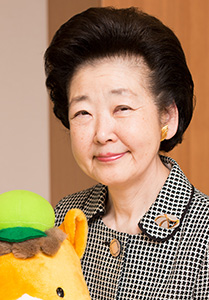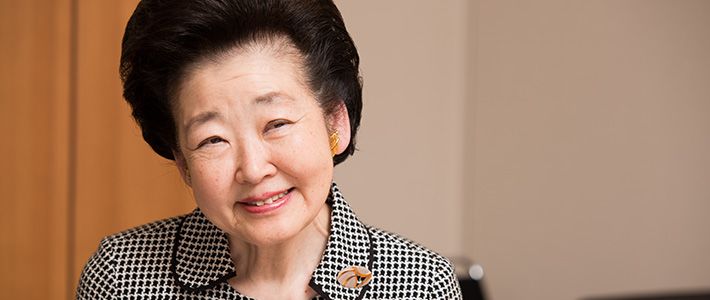
The Many Faces of Japan-China Relations
Popularizing Japan’s “Mother and Child Health Handbook” Overseas
Politics- English
- 日本語
- 简体字
- 繁體字
- Français
- Español
- العربية
- Русский
A System Worth Promoting Overseas
INTERVIEWER The Mother-Child Health Handbook that is used throughout Japan has begun to be introduced in other countries in Asia and Africa, most notably China. How has this system spread beyond Japan’s borders?
FUKUDA KIYOKO It can be traced back to the time of the fourth Tokyo International Conference, or TICAD Ⅳ, held in Yokohama in 2008. I hosted a working luncheon at the event, in my capacity as wife of the prime minister at the time, Fukuda Yasuo. I delivered a speech at the luncheon to tell the foreign visitors some of the great things about the handbook, with which I was familiar from my own experience of raising two boys and a girl. Later, a study group regarding the MCH Handbook was also formed—and it is now in its third year.
From the outset, Wang Wan, the wife of the Chinese ambassador to Japan, participated in the study group. She was very enthusiastic and said that she wanted to help spread the handbook system in China as well. Even though it was impossible to introduce the system to all of China immediately, she was keen to begin by bringing the handbook to Shanghai and Beijing.
Simplifying Things for Chinese Mothers
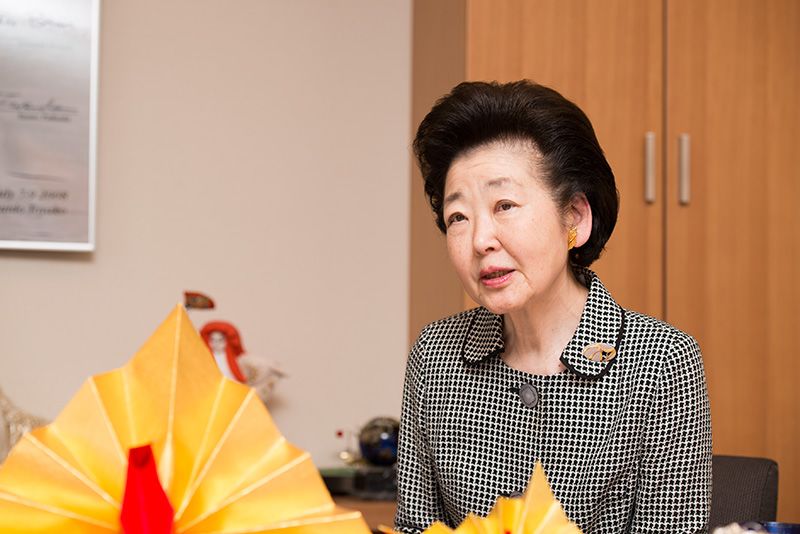 As you know, Chinese parents take childrearing very seriously, given the country’s one-child policy. Wang gathered together members of the All-China Women’s Federation, an influential women’s group, to hold a study meeting on the MCH Handbook in China last April.
As you know, Chinese parents take childrearing very seriously, given the country’s one-child policy. Wang gathered together members of the All-China Women’s Federation, an influential women’s group, to hold a study meeting on the MCH Handbook in China last April.
Other countries have handbooks for health information related to mothers and their young children, but they tend to simply be pocket notebooks for writing down things, such as a diary for a woman to chronicle her pregnancy or to take notes after a child is born. And each notebook is separate, with a different aim. My hope is that these countries will also introduce a comprehensive handbook of the sort we have in Japan, where all the information is kept together. It’s toward that end that I’m focusing my activities.
When I met with the vice-president of the federation, Meng Xiaosi, she told me that in China there are four separate sets of health records for each child. So you can imagine how complicated things would be if a person had more than one child. [Laughs] Meng also thought that the Japanese-style handbook was a good idea since it consolidated all of those different records in one place. I truly hope that China and other countries will see the benefits of this approach.
Building on Private-Sector Exchanges
In April of this year, I attended the Boao Forum for Asia in China and participated in a conference there on women’s issues. I spoke at the event about how the MCH Handbook had begun to spread to other countries around the world, starting with Indonesia. I also explained the merits for China of having a single health handbook, rather than several separate ones. There have been a variety of responses in China to our work on the handbook. The system is not yet at the implementation stage, but thanks to Wang’s enthusiastic efforts, things look promising. I hope that the All-China Women’s Federation will be able to mobilize its affiliated groups and organizations nationwide to help spread the word about the MCH Handbook.
Both Wang and her husband, Ambassador to Japan Cheng Yonghua, speak beautiful Japanese, having lived in Japan as students. Wang told me that there had not been many Chinese exchange students when she was studying at the University of Tokyo, so she benefited greatly from the kindness of her professors and classmates, as well as other Japanese people she met. She also expressed her hope of helping to improve relations between the two countries today through private-sector exchanges. I’ve been in contact with her through email and we are both aware of how the bilateral relations at present are in a delicate situation, given the different standpoints of our countries.
Bringing the Handbook to Africa
INTERVIEWER Up to now, the Japan International Cooperation Agency has played a central role in the concerted efforts to spread the use of the MCH Handbook. And these efforts seem to have intensified further now that you have been appointed as an advisor to the Association to Promote the Mother-Child Health Handbook.
FUKUDA When I addressed the spouses of heads of state from over forty African countries at TICAD Ⅳ in 2008, they listened enthusiastically to my speech on the MCH Handbook. But afterwards some of them told me that even though they thought the handbook was wonderful, their countries did not have the financial resources to introduce it. One of the executive directors of the World Bank, in hearing of this situation, pledged his assistance, provided that the African countries came up with a clear schedule and budget.
Apart from Kenya, though, the MCH Handbook has not come into wide use. In traveling around Africa, I learned how difficult the task is to introduce the handbook because of how vast the countries are. Moreover, I also thought at the time, frankly, that the main priority should be to address the AIDS epidemic, rather than to promote the handbook. When I got back to Japan from my trip, I launched the study groups that I mentioned earlier, based on the idea that the first step would be for the Japanese people themselves to become more knowledgeable about the health handbook.
Free Distribution of the MCH Handbook
INTERVIEWER Expectant and nursing Japanese women living overseas have been able to receive the MCH Handbook through Japanese embassies. What has been the reaction among other people living in those countries?
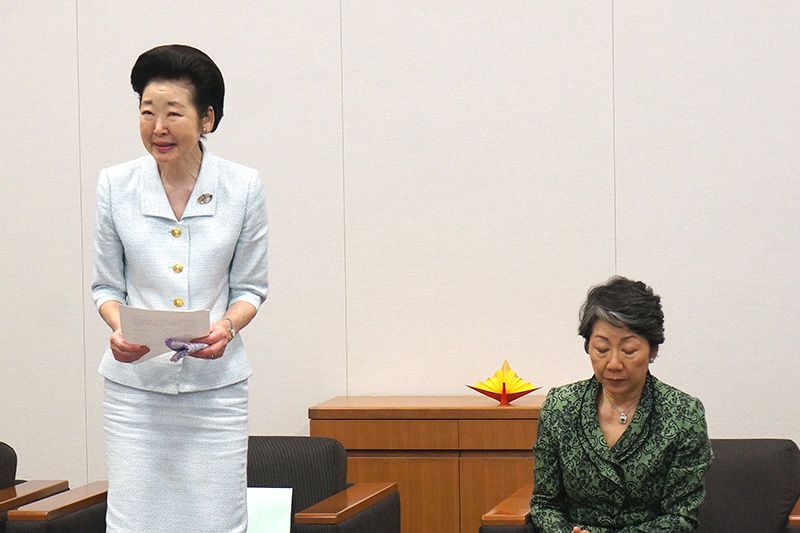 Fukuda Kiyoko delivering a speech on May 14, 2004, in her capacity as advisor to the Association to Promote the Mother-Child Health Handbook, alongside fellow advisor Kōmura Haruko (right).
Fukuda Kiyoko delivering a speech on May 14, 2004, in her capacity as advisor to the Association to Promote the Mother-Child Health Handbook, alongside fellow advisor Kōmura Haruko (right).
FUKUDA In May 2014, I was appointed as an advisor to the Association to Promote the Mother-Child Health Handbook. One of my fellow advisors at this organization is Kōmura Haruko—the wife of Kōmura Masahiko, vice president of the Liberal Democratic Party. The two of us are striving to spread the use of the MCH Handbook. The initiative to offer the handbook to Japanese women overseas stems from a request we had from a woman who had given birth in Boston and was very keen to get one. That led us to distribute the handbook free of charge to Japanese women overseas.
Japanese mothers tend to take the handbook for granted, but women outside of Japan feel a great sense of reassurance when they can have a handbook of this type. Up to now, hospitals overseas have had records regarding pregnancy and childbirth, but individual women have not had ready access to that information. Women living abroad feel comforted, I think, when they can share such information with hospitals through the handbook system.
INTERVIEWER Prime Minister Abe Shinzō has emphasized the importance of policies to leverage the power of women. Given the graying of Japan’s population, what steps do you think are needed in the area of childcare?
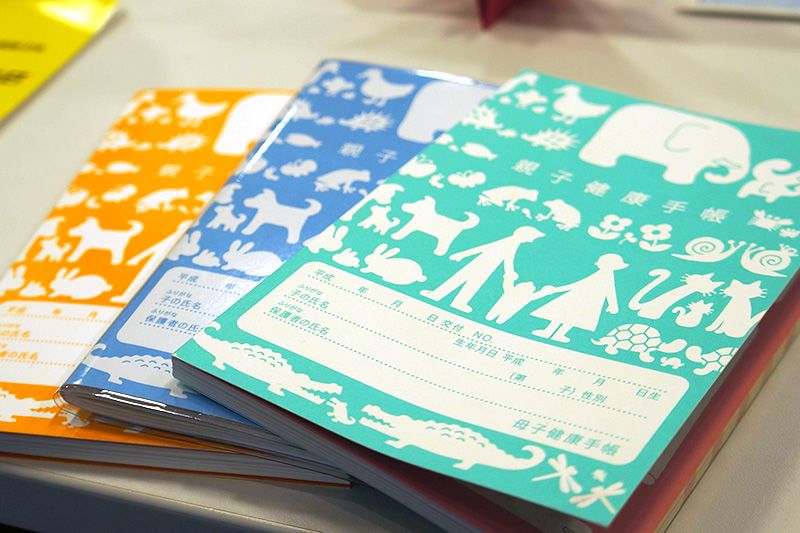 MCH Handbooks are distributed free of charge to expectant and nursing Japanese women living overseas by the Association to Promote the Mother-Child Health Handbook.
MCH Handbooks are distributed free of charge to expectant and nursing Japanese women living overseas by the Association to Promote the Mother-Child Health Handbook.
FUKUDA My primary concern is the safety and wellbeing of expectant or nursing mothers and infants. Japan still had a very high infant mortality rate back in the 1940s, but the introduction of the MCH Handbook in 1964 played an important part in the steep decline in that mortality rate. There is still a high mortality rate for expectant mothers and infants in some African and Asian countries, so I think introducing a similar handbook system would be a positive development. Also, since African countries tend to lack a family registration system, I think that distributing a MCH Handbook to each family could serve that role as well.
MCH Handbook Takes Root in Indonesia
INTERVIEWER Several Asian countries seem to be making very good progress in introducing a health-handbook system. What efforts have taken place to promote the system in Asia?
FUKUDA The most successful case thus far has been Indonesia. That success can be traced back twenty years, to the time when an Indonesia doctor traveled to Japan to learn more about our healthcare system and was deeply impressed by the MCH Handbook. When he returned to his country, he set about telling Indonesians about the wonderful handbook program. Indonesia is a nation composed of many peoples, so handbooks were created for each ethnic group. Currently, Indonesia is involved in providing guidance on the MCH Handbook to neighboring countries.
This effort has made me keenly aware of the importance of winning over physicians to this cause, in addition to enlisting mothers themselves as proponents of the system. For our distribution effort this time around we will hand out around 15,000 handbooks to Japanese living overseas, and I hope that these mothers will in turn play a leading role in spreading the word overseas about the MCH Handbook.
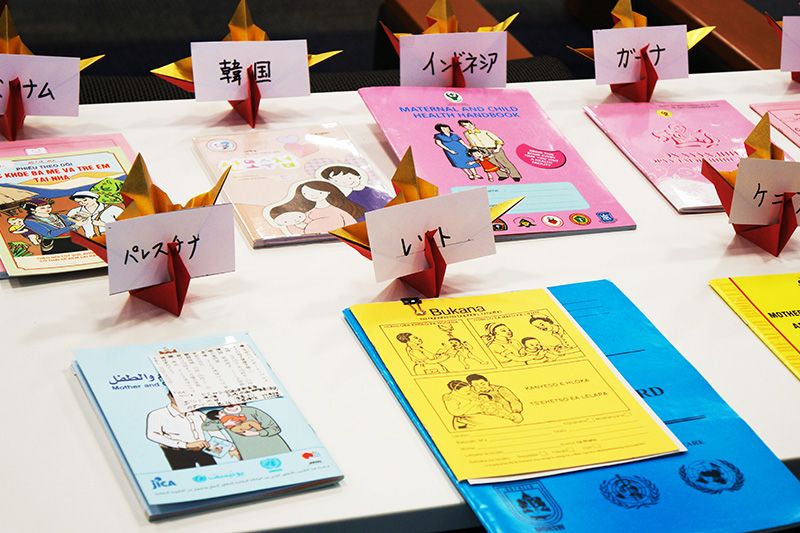 Some of the MCH Handbooks created in Vietnamese, Korean, Indonesian, and other languages. These handbooks are helping to improve mother and infant health in various countries.
Some of the MCH Handbooks created in Vietnamese, Korean, Indonesian, and other languages. These handbooks are helping to improve mother and infant health in various countries.
INTERVIEWER So the MCH Handbook is also spreading to other countries?
FUKUDA That’s right. For instance, Palestinians previously had difficulties creating their own handbook due to a lack of printing facilities. But they managed to overcome those difficulties and, thanks to assistance from JICA, have created a handbook. It’s not possible for JICA to support a single country over a long period of time, though, so there is talk of discontinuing the assistance, which raises the concern that the effort to expand the use of handbooks there may come to an end.
Outreach with Wives of Ambassadors
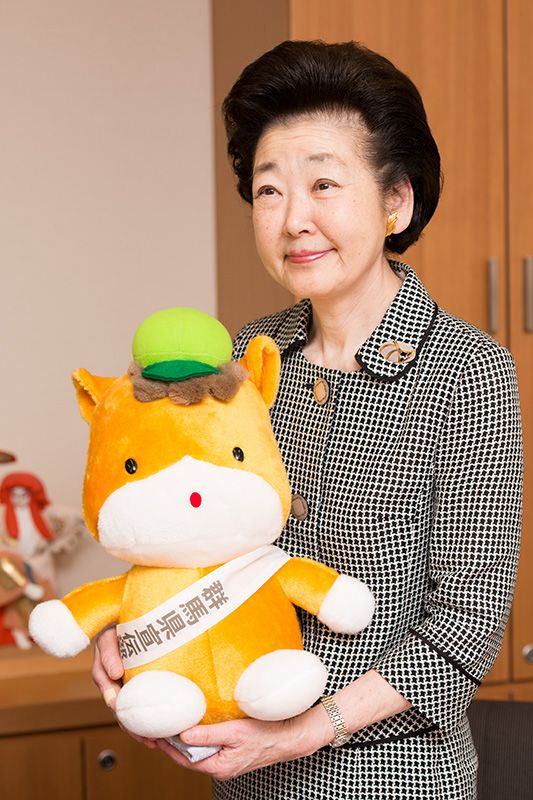 Fukuda Kiyoko holding the promotional mascot of Gunma Prefecture, “Gunma-chan.” She was in the prefecture as part of her effort to promote the MCH Handbook in Japan and overseas.
Fukuda Kiyoko holding the promotional mascot of Gunma Prefecture, “Gunma-chan.” She was in the prefecture as part of her effort to promote the MCH Handbook in Japan and overseas.
One initiative I’m involved in now is to gather together the wives of ambassadors to hold tea-ceremony events. A total of 13 women have taken part in the event, including the wives of ambassadors from Jordan, Canada, and Spain. I want to use those gatherings as an opportunity to invite the women to join the study group on the MCH Handbook. I think that this will be a way to raise awareness among these women in various countries of the importance of the handbook.
Tea, of course, is just one of many elements of Japanese culture that originated in China. The topic of the cultures of Japan and China reminds me of how Wang Wan, who attended one of the tea ceremonies just mentioned, was able to effortlessly read the calligraphy on the scroll displayed as we waited for the tea-ceremony teacher to arrive. That gave me some idea of just how seriously she has set about studying Japanese culture and how well-versed in it she has become.
Incidentally, at an exchange event with Chinese in Gunma Prefecture sponsored by the Japan-China Friendship Association, Wang gave a speech as part of the diplomatic work she carries out in her role as councilor for the Chinese Embassy’s department in charge of goodwill exchanges. Once she began her speech, the clarity of her logic was magnificent. The audience, made up of people from various prefectures, was so impressed that we even received requests from those who wanted to visit the Chinese Embassy in Tokyo. This gives you some idea, I think, of how she’s using her charm to promote friendly relations between Japan and China. I believe that our bilateral relations can become closer through such face-to-face interaction. Indeed, I think that on the individual level, people from both countries get along quite well.
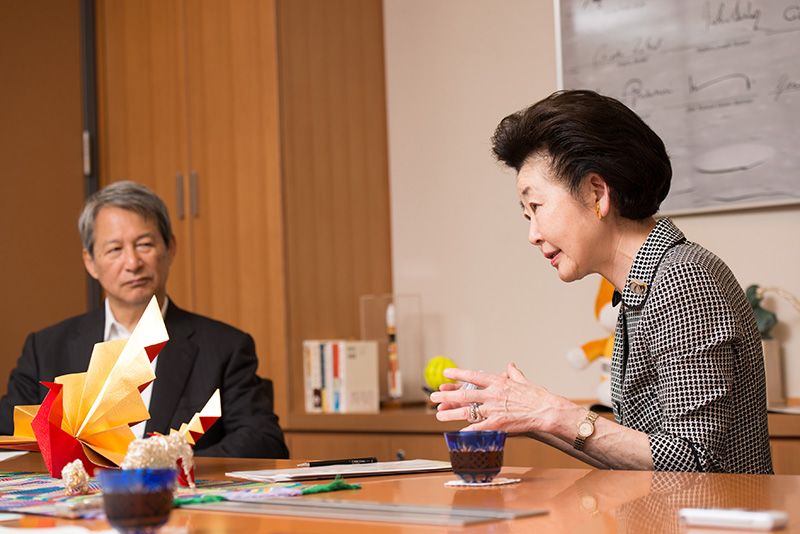 A scene from Fukuda Kiyoko’s interview with Nippon.com senior editor Shiraishi Takashi (president of the National Graduate Institute for Policy Studies).
A scene from Fukuda Kiyoko’s interview with Nippon.com senior editor Shiraishi Takashi (president of the National Graduate Institute for Policy Studies).
The Need for Courtesy
INTERVIEWER Many years have passed since the normalization of Japan-China diplomatic relations in 1972. How do you view Sino-Japanese relations today?
FUKUDA It seems to me that there is mutual respect between Japanese and Chinese people. As long as there is that sort of emotional tie between the people of both countries, then even if troubles emerge, they can be quickly resolved. My husband [former Prime Minister Fukuda Yasuo] traveled several times to China last year alone. I think that it will be through such personal interaction that the bilateral ties will be built up.
As the tea master Sen Genshitsu once said, “Courtesy is the crux of relations between countries. Treating each other with respect brings peace and ease.” The doctrine of liangzhi (innate knowing) of the Neo-Confucian scholar Wang Yangming also stresses that it is by knowing your own good qualities as well as those of others that you can treat another person with compassion and act in a correct manner. I think that when individuals in Japan and China forge relations on the basis of such wisdom, then their countries’ bilateral ties will also prosper.
(Translated from a May 21, 2014, interview in Japanese. Interviewers are Harano Jōji, representative director of the Nippon Communications Foundation, and Shiraishi Takashi, senior editor of Nippon.com. Interview photos by Kodera Kei.)
